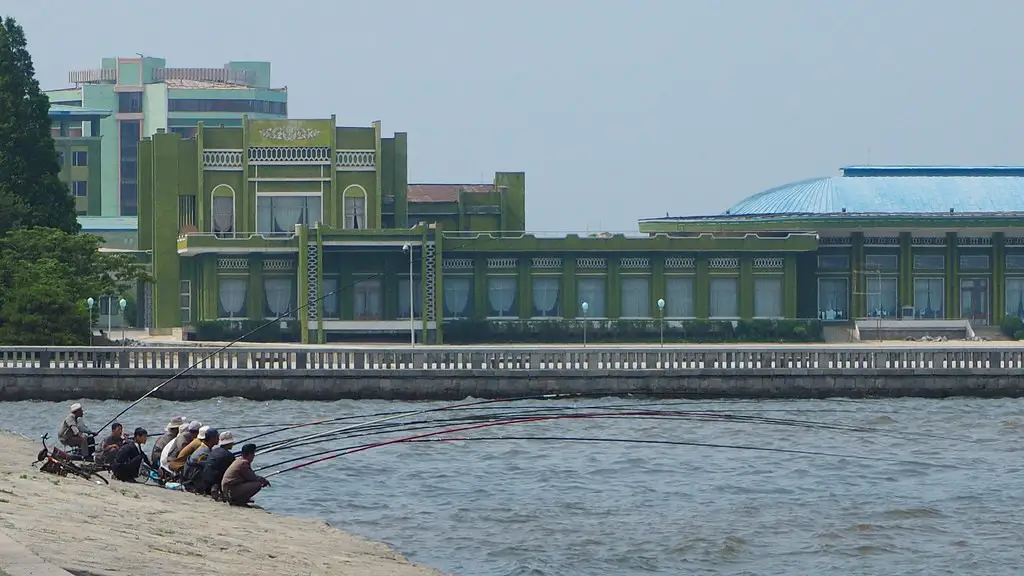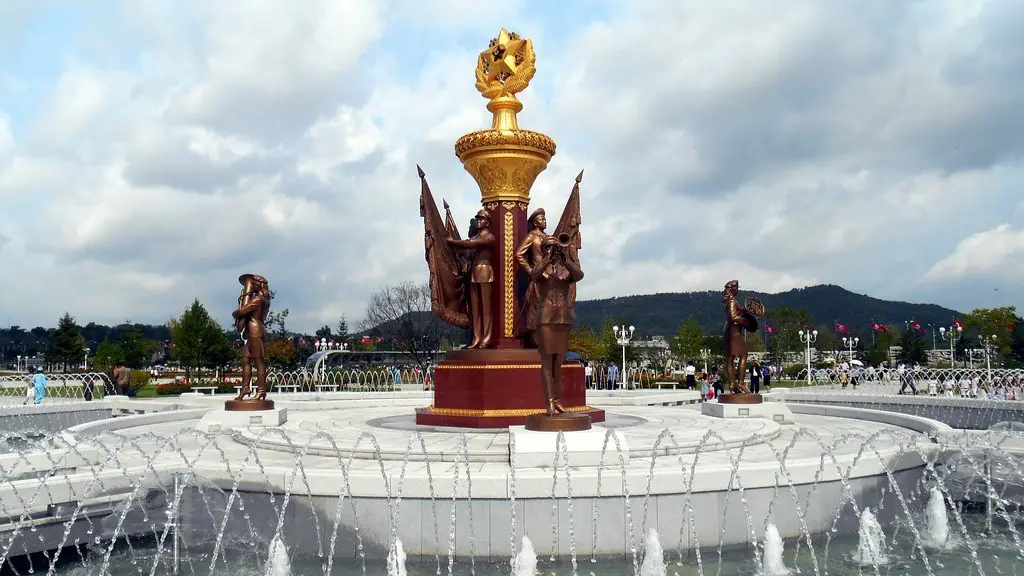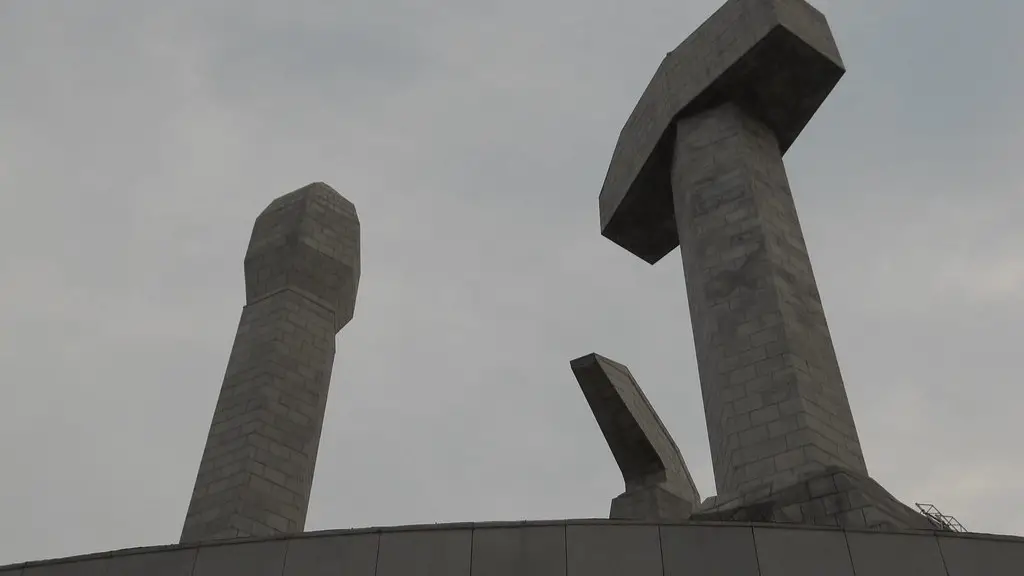North Korea has become a source of immense concern for the international community. From the secretive country’s possible development of nuclear weapons, to its callous treatment of its citizens and the political saber rattling the hermit kingdom produces on a regular basis, understanding who hates North Korea, and why, is an important factor in understanding the current state of the Korean peninsula.
Political Motivations
The political climate has, for decades, been at the root of many hostile feelings toward North Korea. From its refusal to divulge information about its nuclear program, to its repeated violations of international laws and regulations, North Korea has maintained an antagonistic relationship with many countries.
At the same time, North Korea’s repressive and controlling government has not made many friends. Its frequent arrests and imprisonment of dissenters, and its aggressive human rights violations have been a source of concern to many of the world’s leading powers.
In addition, the hermit kingdom’s repeated and overt threats to other nations, such as South Korea and United States, has been a serious source of tension in the region. Its brinksmanship and occasional bellicosity, such as its provocative military drills, have generated a great deal of anxiety in the international community.
These motivations have been at the root of many of the hostilities toward North Korea, driving the international community to seek punitive measures, such as UN sanctioned embargos and travel restrictions, against the country.
Economic Motivations
In addition to the political motives, there are also some economic reasons why North Korea may be held in such disfavour. The country is known to have a number of economic sanctions imposed on it by the United Nations, as well as by individual countries, due to its refusal to comply with international standards.
In addition, North Korea has been accused of maintaining its own network of ‘slave labor’ camps, in which prisoners are used as a source of cheap labor. North Korea is also thought to engage in illicit economic activities such as counterfeiting, money laundering and illegal weapons exports, all of which contribute to its poor standing in the international community.
Furthermore, the hermit kingdom is known for its support for a number of militant groups in various parts of the world, which also does not endear it to many people; this is especially true for countries such as India and Israel, which have both previously been targeted by North Korean sponsored attacks.
Ideological Motivations
Finally, there are some ideological motivations behind those who hate North Korea. North Korea is widely perceived as being a closed, authoritarian state, whose rulers have been known to be unsympathetic to the needs and desires of its citizens.
In addition, North Korea follows a Stalinist version of communism, and its leaders have had very little regard for the rights of individuals or for the democratic process. This has been particularly problematic for many countries in the international community who espouse a more open, ‘liberal’ approach to politics and governance.
The hermit kingdom’s isolationist policies have also contributed to this disdain. North Korea’s refusal to open its borders to the outside world, or to permit foreign investment and trade, has made the country a target of international criticism and resentment.
Possible Solutions
The global community has, for some time now, been seeking ways to address the issues posed by North Korea. The international community has been at the forefront of these efforts, seeking to both support its citizens and to counter the country’s aggressive posture.
Countries such as South Korea, Japan and the United States have been particularly active in seeking to improve the lives of North Korean citizens, promoting measures such as economic exchanges, food aid and humanitarian programs. In addition, various international organizations, such as the United Nations, have sought to use diplomatic means to find peaceful solutions to the many issues posed by the hermit kingdom.
At the same time, however, other countries such as China have sought to use their own economic and political ties to North Korea to help resolve the crisis. China, in particular, has sought to use its own economic and political clout to dissuade North Korea from continuing its activities, and has played a major role in helping to reduce tensions between the allies and North Korea.
Public Opinion
The public opinion is also worth considering when asking “who hates North Korea?”. Surveys have found that public opinion on North Korea is overwhelmingly negative, both within the country and abroad. Many believe that the North Korean regime is a cruel and brutal dictatorship, and has no intention of changing its course.
Many people have also expressed concerns regarding North Korea’s nuclear program, which is seen as a dangerous tool that could potentially be used to threaten global security. Public opinion has also been strongly negative towards the country’s human rights record, which is seen by many as unconscionable and unjustifiable.
All of these factors have contributed to a general feeling of distrust, fear and loathing towards North Korea, which has driven many of the reactions from the global community.
Impact of Hate
It is clear that North Korea is widely disliked by many in the international community. This antipathy has often been reflected in the sanctions, embargoes and other punitive measures taken against the country by the United Nations and some of the world’s major powers.
These measures have had a profound effect on the North Korean people, and have served to exacerbate the country’s already dire economic and social plight. It is therefore clear that a better understanding of the motivations behind who hates North Korea, and how to address the underlying issues, is essential to finding a way to move forward.
Economic Sanctions
One of the most commonly used methods of addressing North Korea has been to impose economic sanctions. These sanctions have been designed to restrict North Korea’s ability to finance its nuclear and military programs, as well as to restrict its access to international markets.
These sanctions have, however, had limited success in curbing North Korea’s activities. In addition, the sanctions have often been blamed for worsening the country’s already dire economic situation. This has led to criticism that these sanctions have only served to punish North Korea’s citizens, while doing little to address the underlying problems.
Military Action
The other possible approach to dealing with the North Korean situation is through the use of military force. This option has, however, been roundly rejected by the international community due to its potential for devastating effects and its lack of certainty for a successful outcome.
Additionally, many of the countries in the region, such as South Korea and Japan, are wary of military action due to the potential for massive civilian casualties, as well as its potential to destabilize the region. Despite these concerns, some countries, such as the United States, have recently bolstered their military presence in the region, in an effort to signal to North Korea that any further provocations will bring swift and decisive retribution.
Dialogue
The third option for addressing the North Korea situation is through dialogue. Diplomacy has long been seen as the preferable route for resolving international crises, and this has been widely advocated for by various governments, international organizations and NGOs.
Much effort has been devoted to finding a way to engage North Korea in meaningful dialogue, with the ultimate goal of eventually normalizing the relationship between the country and its neighbors. This, however, has proven to be a difficult proposition, as North Korea has yet to show any willingness to change its stance on the issues that are of concern to the international community.
Role of China
Given North Korea’s close relationship with China, the role China plays in the unfolding situation is also of great importance. China is widely seen as the most important player in the North Korean situation, and has sought to use its influence to nudge North Korea in a more conciliatory direction.
At the same time, China has also been accused of not doing enough to pressure North Korea to abandon its nuclear weapons program, or to address its human rights abuses. Nevertheless, China is considered to be one of the only countries that has the ability to bring about meaningful change in the hermit kingdom, and its role in the situation will remain of great importance.
It is clear that numerous factors have contributed to the current situation with North Korea, and there is no easy solution to the many issues posed by the hermit kingdom. However, the various motivations behind who hates North Korea, and how these are being addressed, are important considerations in finding a way forward and restoring peace and stability in the region.





